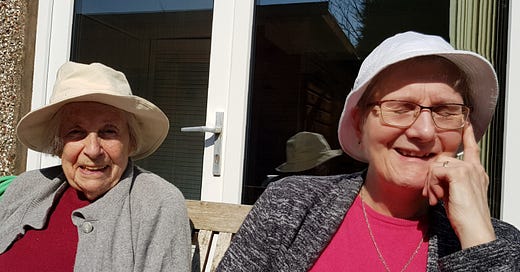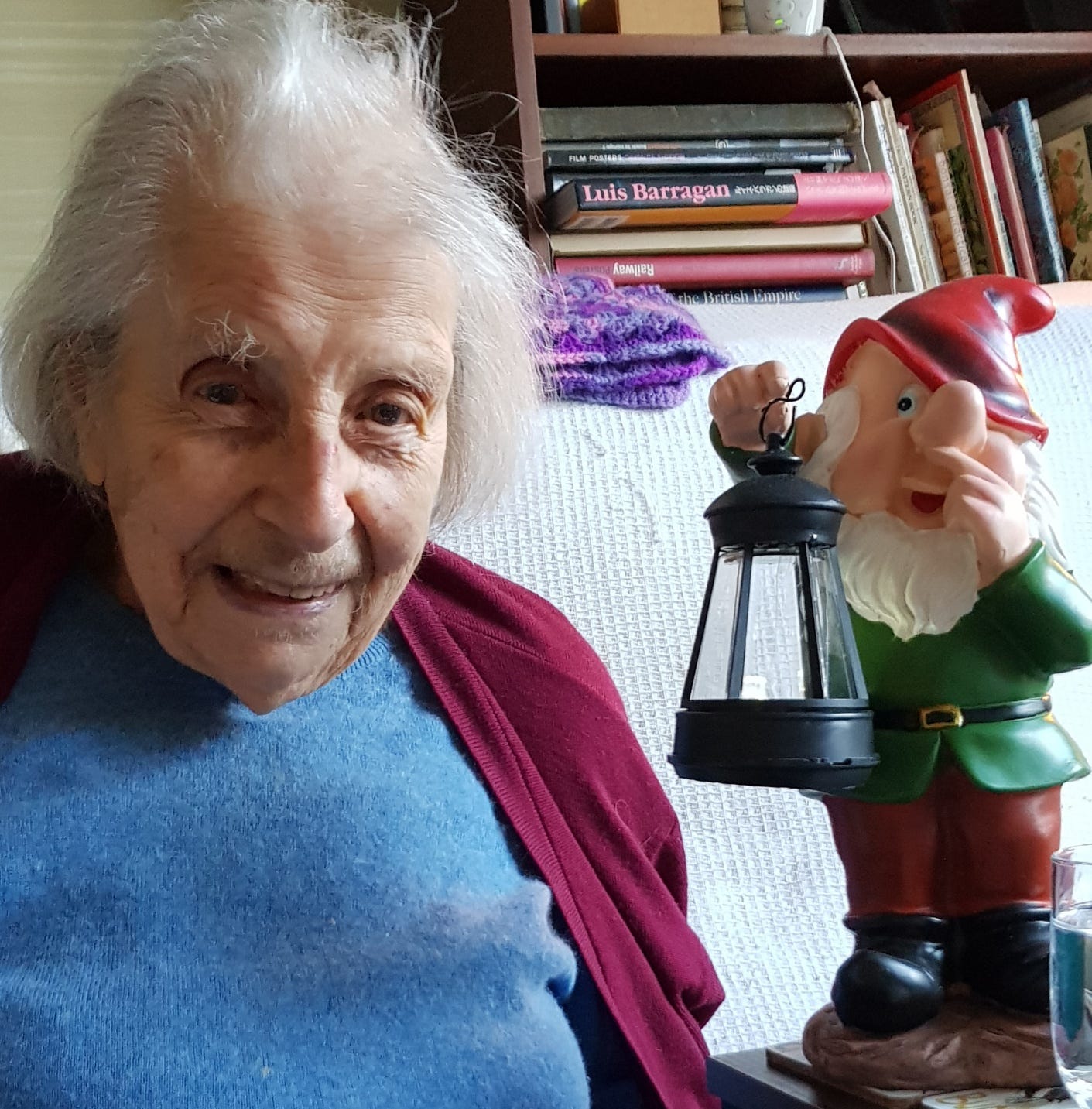Why…?
My first COPING WITH CARING Substack post outlined that I’m unpaid care giver for two vulnerable ladies, my mother aged 99 and my wife aged 67.
Care giving creates a new, unexpected, hectic chapter in the carer’s life. Familiar home routines are scrambled, Sky Sports is cancelled, and “want-to-do” lists are consigned to the waste bin.
My wife’s life was turned upside down by MS more than 30 years ago. She was a State Registered Nurse and Community Midwife. Today, she busies herself with the garden and crafts, and helps as much as she can in the kitchen. I can see her enduring frustration and pain every day.
My relationship with my mother was never great. I have an abiding childhood memory when she told me our (admittedly mischievous) dog had:- “Gone to live on a lovely farm…” She remembers little of those times.
So why am I now her care giver:-
Necessity?
Obligation?
Our dysfunctional system of social care?
None of those. Nor is it about love, or pity, or even duty. I can best describe it as empathy and compassion for two vulnerable ladies close to me, who need my help. This has to be empathy and compassion which wholly respect their own human individuality and dignity.
Help and Support
Do I get practical help and support?
Nope.
Not one iota…
Unless you count my wife’s fortnightly visiting physiotherapy sessions, which she needs to help cope with her MS, and which we pay for. I clear away dining room furniture to make space for the guy’s fold-up physio bench.
I once emailed the local Care Coordinator to ask if I could discuss a contingency plan in case I ceased to be able to care. 3 years later, no reply.
On rare visits to the local GP Practice, they quiz me:- “Who is it you care for?”, “How old are they?”.
One day, we queued in the street with wheelchair and walking frame for vaccinations. The three of us struggled in. There was a large “Age UK” publicity banner displayed in the waiting area. Item 1 on their list was “Carer Health Checks”…
…Not for me, it seems. At a previous encounter the GP gleefully propelled his chair across to his screen and banned me 😅, with a smug smile which said “Gotcha matey, you’re not a carer, you’re a time waster”. Not that I minded too much. 20 minutes with a dour nurse wondering why I was there, and whose top lip curled at regular intervals, was a waste of everyone’s time.
And so, for whatever reason, they refuse to believe I’m a care giver.
Maybe, a recognition that there are good male care givers out there would be an irksome deviation from somebody’s radical feminist ideology…?
Surely not!
Happiness
Care givers strive to be super-human. We morph on demand into attendants, comforters, dressers, mediators, mentors, nurses, podiatrists, psychologists, waiters, weightlifters and more. I try. but cannot excel in all those roles. My personal bandwidth has limits, and my age is beginning to tell:-
I talk to myself a lot.
I talk to the dog a lot. (He’s very supportive…)
I capture new ideas and thoughts by writing them down before they fade away.
That they are washed, dressed, fed, watered, tea’d, cared for, kept safe, is not enough. My most important measure of success is whether those I care for are Happy. I try to understand what makes them Happy. If you have a mind to, you can explore and apply a multitude of pillars and theories from Aristotle et al. For those I care for, Happiness seems to work at two simple subjective levels - separate episodes of well being, and more enduring feelings of positive life satisfaction.
And there, I find a paradox. My mother’s declining faculties seem to allow her enduring happiness. She’ll say:- “I’ve had a good day today”, when she’s done little more than binge watch Britbox and Sky News. Is that a “legitimate” experience of happiness? I think it is.
I’ve tried to engage her with books, crosswords, jigsaws and painting to no avail. She’s happy when sneaks a mouthful of marmalade straight from the jar at breakfast, has a jam tart with her 3pm cup of tea, has strawberry jelly with her fruit cocktail in the evening, or gets to sit in the summerhouse on a fine afternoon. But what she loves most of all are gnomes, her garden gnomes.
For my wife, with mental faculties fully intact, enduring happiness can be elusive. She regrets ever agreeing to my mother moving in, and that can be a source of friction. I will never knowingly abandon either of them to our system of social care. She loves her greenhouse, her Koi, Orfes and Grass Carp in our pond, Whatsapp videos of the grandchildren, and her crafts. These things make her happy, or at least, contented.
The house environment is such an important catalyst for happiness:- our dog, the nightlights, the fresh flowers I buy every week.
This evening after tea I asked both ladies the question. From mother - an emphatic “Yes”. From my wife - a more hesitant “Yes”. No sign of deference or sarcasm. By no means complacent, that’s probably the best I could have hoped for.







Thank you very much Nat. I was apprehensive about this post and I'm so glad it resonated. And thank you very much for sharing your experiences. I'm realising how important it is to be able to do that.
I'll never understand our almost pathological resistance to designing a care system that actually works. We apparently have endless money for all kinds of schemes, wars, 'VIP fast-lanes' and more, but as soon as anybody asks the question about whether we might spend a few quid to make people comfortable and live with dignity, suddenly it's the end of the world. You can be a milionaire and the state will throw buckets of cash at you willingly, but if you're just a normal person then you need to navigate a maze of dystopian checks and inquisitions to be granted a sum which wouldn't even get you through a Gregg's sausage roll, never mind a basically dignified life.
Regardless - despite the official support - it seems to me like you're doing as good a job as you could hope to do. Thank you for sharing - and I hope your Substack is giving you more people talk to than your dog - wise and supportive as he may be!